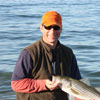5 Fly Casting Tips for Quick Improvement
By Tom Keer
Sep 21, 2016
Fly fishing is easy if you let the rod do the work. Learn these five fly fishing basics to improve your technique and catch more!
If I hand a spinning rod to a fisherman, they cast like a champ in minutes. If I hand that same rod to a new angler, it takes a longer time. I'm not sure why that is, but maybe some fly casting tips will help.
Fly Fishing Basics to Fast-Track Your Success
1. Let the rod do your work. Fly casting is a lot like archery or pole vaulting. In archery, the bow bends and when released, the arrow flies. In pole vaulting, the pole bends and catapults the athlete. A fly rod is similar, and it flexes, and when it un-flexes it shoots the line. Let the rod do your work and the line will slide through the guides.
2. Don't think, feel. On either a back or forward cast, the fly rod needs to load. What that means is that your line needs to straight out and pull the rod back, just like in archery. When you feel the rod load, it's time to go forward. The feeling is partly why folks say fly fishing is a thoughtful sport. Don't think, feel.
3. Timing is everything. If you wait too long your straight line drops. If you wait too short your rod isn't flexed. There is a time in the point where the line is straight and your fly rod is flexed. That's when you move on to the next part of your cast. It's just like releasing a basketball in a jump shot. If you release on the way up or on the way down your shot falls short. If you shoot right when you're suspended and neither going up nor down, you hit three-points all day long.
4. Casting is important, but technique is critical. So if your fly casting stinks you can't go fly fishing? Not necessarily. If you can find fish and present your fly naturally you can catch fish. Drift your dry flies and nymphs naturally and without drag and you can hook 'em up. Try pocket water where trout need to make a quick decision or otherwise miss a meal. Short casts are perfect in that kind of water anyway, so keep that in mind even if you do follow my fly casting tips and improve you technique.
5. Pick fish that are easy to catch. Panfish, smallmouth bass, bluefish, and the like are forgiving fish. Move on to more challenging species as your skill increases. And pick water that you are sure holds fish.
Fly fishing takes some practice, but if you relax you'll pick it up faster than if you try to force it. Hopefully these fly casting tips will give you a place to start. Get your fishing license and enjoy the game!
Fly Fishing Basics to Fast-Track Your Success
1. Let the rod do your work. Fly casting is a lot like archery or pole vaulting. In archery, the bow bends and when released, the arrow flies. In pole vaulting, the pole bends and catapults the athlete. A fly rod is similar, and it flexes, and when it un-flexes it shoots the line. Let the rod do your work and the line will slide through the guides.
2. Don't think, feel. On either a back or forward cast, the fly rod needs to load. What that means is that your line needs to straight out and pull the rod back, just like in archery. When you feel the rod load, it's time to go forward. The feeling is partly why folks say fly fishing is a thoughtful sport. Don't think, feel.
3. Timing is everything. If you wait too long your straight line drops. If you wait too short your rod isn't flexed. There is a time in the point where the line is straight and your fly rod is flexed. That's when you move on to the next part of your cast. It's just like releasing a basketball in a jump shot. If you release on the way up or on the way down your shot falls short. If you shoot right when you're suspended and neither going up nor down, you hit three-points all day long.
4. Casting is important, but technique is critical. So if your fly casting stinks you can't go fly fishing? Not necessarily. If you can find fish and present your fly naturally you can catch fish. Drift your dry flies and nymphs naturally and without drag and you can hook 'em up. Try pocket water where trout need to make a quick decision or otherwise miss a meal. Short casts are perfect in that kind of water anyway, so keep that in mind even if you do follow my fly casting tips and improve you technique.
5. Pick fish that are easy to catch. Panfish, smallmouth bass, bluefish, and the like are forgiving fish. Move on to more challenging species as your skill increases. And pick water that you are sure holds fish.
Fly fishing takes some practice, but if you relax you'll pick it up faster than if you try to force it. Hopefully these fly casting tips will give you a place to start. Get your fishing license and enjoy the game!
Popular Posts









